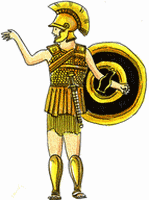Maps of the Antique
Mediterranean Sea
 Greece Greece
 Attic Attic
 Some dates Some dates
 Archaeological sites Archaeological sites
 Pottery and ceramics Pottery and ceramics
 Corinth Corinth
 Magna Graecia Magna Graecia
 Apulia Apulia
 Daunia Daunia
 Gnathia Gnathia
 Campania Campania

|
ATTIC: SOME DATES
Neolithic : men occupy the site of the Acropolis (the primitive inhabitants of Greece are called Pelasges).
15-12th century B.C.: the Achaens (Mycenians) occupy Greece
ca 800 B.C.: Athens results from the union of villages having avoided the Dorian invasion
620-480 B.C. (archaïc period): large temples are built on the Acropolis. The victories of Marathon (491) and Salamina (480) against Persians mark the beginning of the classic period and the summit of Athens.
451-429: Pericles rules the city. Construction of the Parthenon, the Propylees, the temple of Athena Nike, the Erechthéion, etc.
431-404: the Peloponnesian War puts an end to the political supremacy of Athens.
338 B.C.: With the battle of Cheronee won by Philippe II, Athens enters the Macedonian empire.
323 B.C.: after Alexandre’s death, the city declines.
86 B.C.: the Romans occupy Athens which remains however a intellectual centre. At the beginning of our era, the city counts 300.000 inhabitants.
53: Saint Paul preaches christianity.
117-138: The emperor Hadrian, who is fond of greek culture, develops the city (Hadrian’s library, temple of Zeus, etc).
Durin the Byzantine Empire, Athens is just a small provincial town.
529: The philosophical schools are closed and transformed into private christian schools.
1204: During the 4th crusade, the crusaders plunder Constantinople and the French set up the duchy of Athens.
1458: the city falls under the power of the Ottomans.
1687: Athens is besieged by the Venetians, whose cannons shoot at the Parthenon. Since Turks used it as explosives magazine, it is badly damaged.
1821 : war of Independence. Athens is liberated from the Turkish occupation, but the Turks occupies again the town from 1827 to 1833.
1834: The almost uninhabited city is proclaimed capital of the new Kingdom of Greece.
|

















